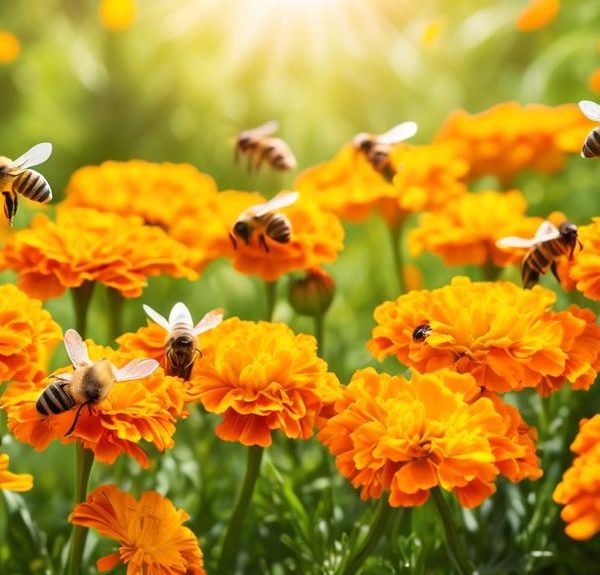Overcome your bee woes safely and sustainably with our guide on how to get rid of bees without killing them – it's a buzz-worthy read!
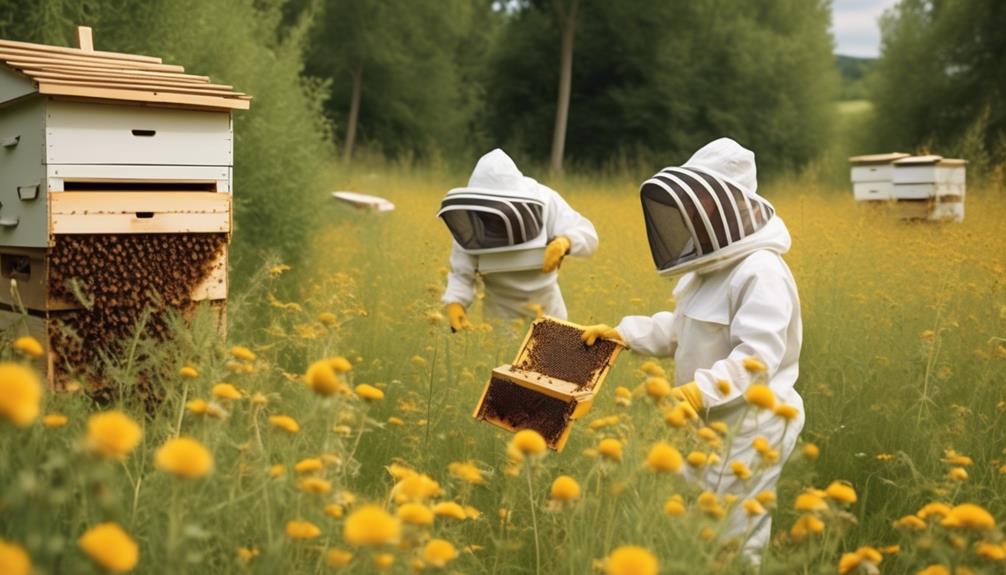
How to Get Rid of Bees Without Killing Them?
Did you know that nearly one-third of the food we consume each day relies on pollination mainly by bees?
Yet, it's a common dilemma to have these buzzing creatures build their hives in our homes and gardens, causing discomfort and potential danger.
You're not alone if you've considered removing these bees, but here's the catch – we can't just exterminate them without risking serious environmental repercussions.
So, how do you rid your space of bees without causing harm to these crucial pollinators?
Stick around, as we explore some tried-and-true techniques that might just surprise you.
Key Takeaways
- Bees are essential for pollination and should be protected rather than killed.
- Natural bee repellents such as peppermint oil, vinegar, and cinnamon can be used to deter bees.
- DIY techniques like bee traps can safely relocate bees to a different location.
- Hiring professional beekeepers is recommended for large bee colonies to ensure safe removal and relocation.
Understanding Bee Behavior
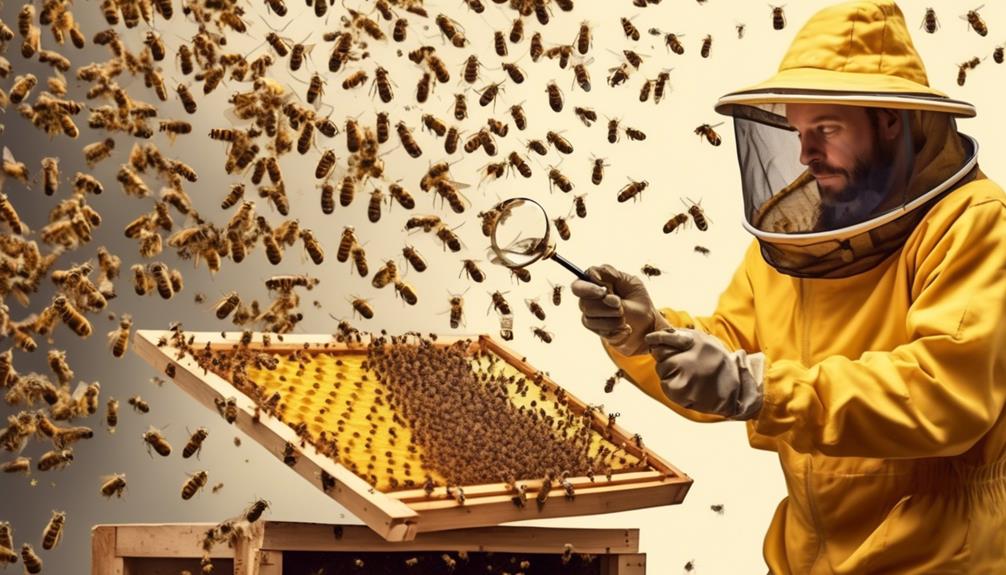
To effectively manage bees without causing them harm, it's crucial that you understand their behavior and the reasons behind it. Bees aren't inherently aggressive. They're typically defensive, protecting their hives from perceived threats. If you've noticed an increased bee presence, there's likely a hive nearby that they're safeguarding.
You should also know, bees don't just buzz around aimlessly. They're purpose-driven creatures. Worker bees, for instance, are foragers. They're out collecting nectar and pollen to feed the hive. They also play a role in pollination, which isn't just beneficial, it's vital for our ecosystem.
Understanding their communication is also key. Bees communicate through a series of dances, known as the 'waggle dance'. This informs other bees about the location of food sources. If you see bees performing this dance, it's a signal that there's a hive nearby.
Lastly, remember that bees are seasonal. They're most active during spring and summer when flowers are in bloom. However, during winter, they retreat into their hives to conserve energy. Consequently, if you're planning on relocating a hive, spring is the best time to do so.
Natural Bee Repellents to Use
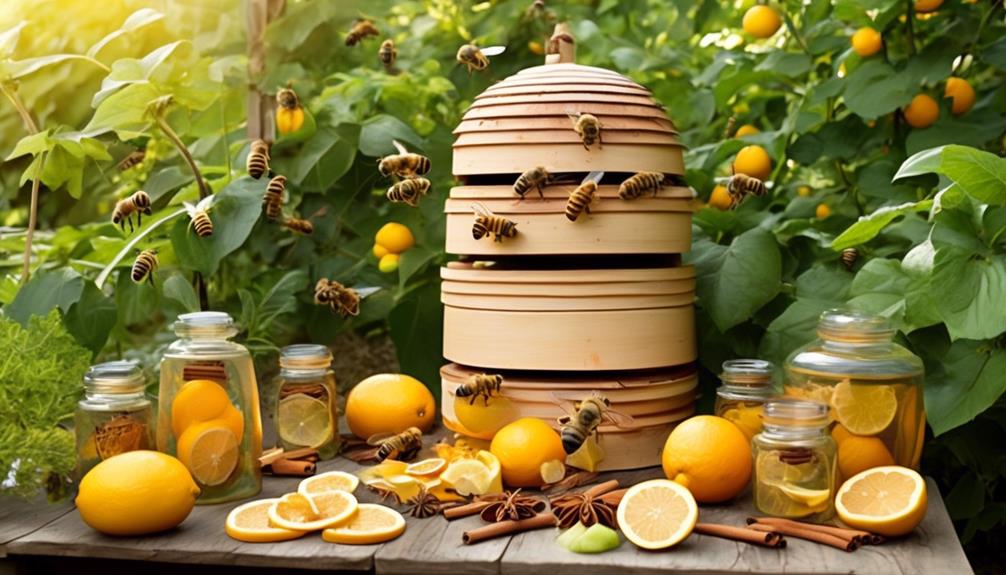
Several natural bee repellents can effectively discourage bees from your property without causing them harm. One of these is peppermint oil. Bees dislike the scent of peppermint, so you can plant peppermint plants or spray a mixture of water and peppermint oil around your property. Remember to apply this mixture frequently, as its effect can wear off after a while.
Another natural deterrent is vinegar. A spray of vinegar and water can be a potent bee repellent. However, be cautious while using vinegar around plants as it can affect their health.
You can also opt for cinnamon. Sprinkling cinnamon around their hive for a week can encourage bees to relocate their hive. Bees don't like the smell of cinnamon, and they'll likely find a new home away from your property.
Lastly, consider using mothballs. Despite their name, mothballs can deter a variety of insects, including bees. Hang them in the areas where bees frequent, but be sure to keep them out of the reach of children and pets, as they're toxic.
DIY Bee Relocation Techniques
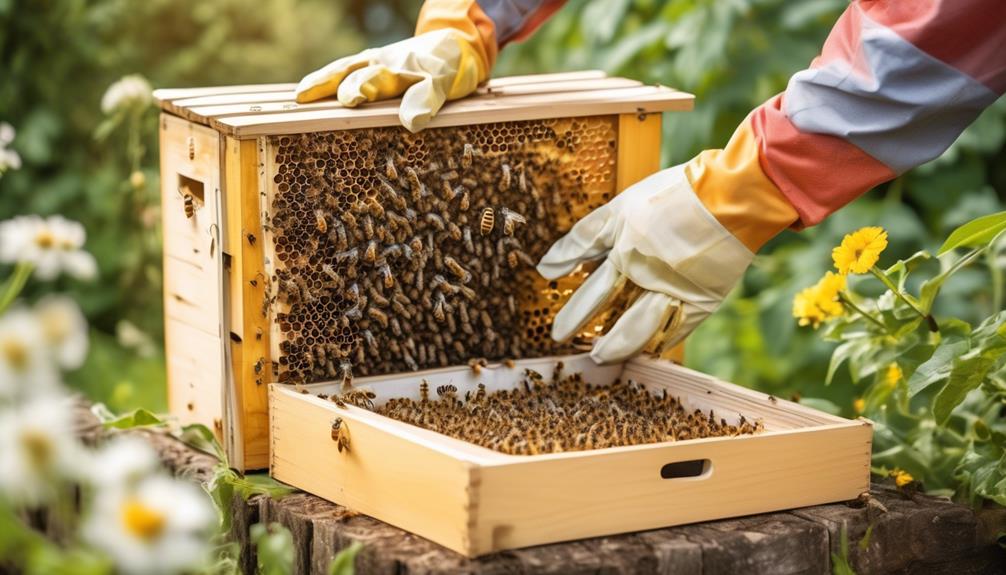
While these natural repellents can deter bees, you might find yourself in a situation where a more hands-on approach is needed, like implementing DIY bee relocation techniques.
You'll need to first identify the type of bee you're dealing with. Honey bees, for example, are highly beneficial to the environment and are typically relocated by professional beekeepers. If you've got a colony of these, it's best to contact a local beekeeper who'll usually be happy to take them off your hands.
If you're dealing with less beneficial species like carpenter bees, consider a DIY bee trap. These traps are made from simple materials like wood and a plastic bottle, and they're designed to lure the bees in without harming them. Once trapped, you can release them at a location far from your home.
Hiring Professional Beekeepers
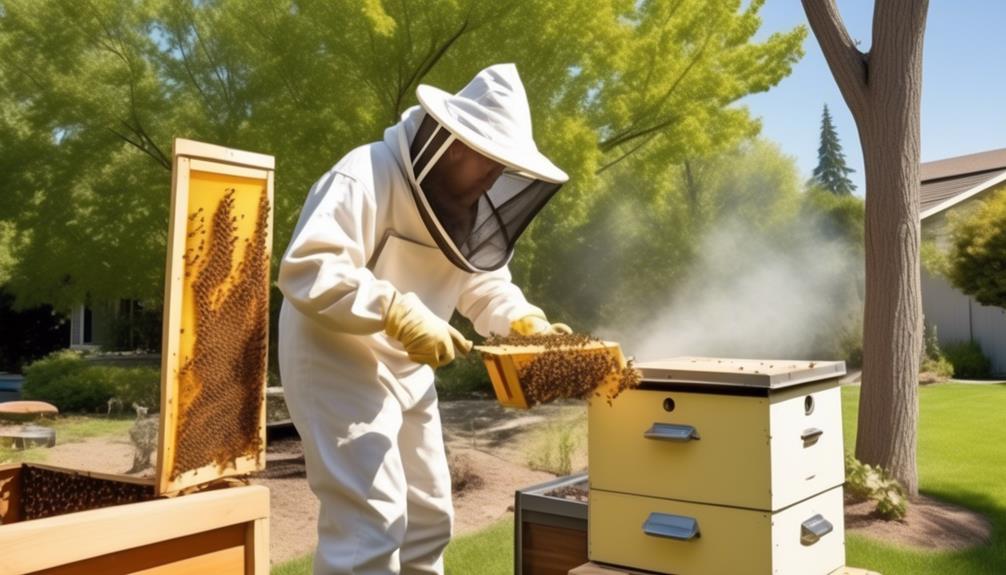
In cases where you're dealing with a large colony of bees, especially honey bees, it's recommended that you hire a professional beekeeper for safe and effective removal. These experts are trained in bee behavior, have specialized equipment, and understand the importance of preservation. Their goal isn't just to remove the bees from your property but also to relocate them to a safe environment where they can continue to pollinate and produce honey.
You might wonder why you shouldn't just exterminate the bees. The answer is simple: bees play a critical role in our ecosystem. They're responsible for pollinating a significant portion of our food crops. Without them, our food supply would be in serious jeopardy.
While it's possible to handle a small bee infestation on your own, a large colony is a different matter. The process can be dangerous if not handled correctly. Professional beekeepers have the knowledge and experience to minimize risk.
When looking for a professional beekeeper, make sure they're licensed and insured. Ask about their removal process and how they ensure the bees' survival. Remember, the goal isn't just to remove the bees, but also to preserve them.
Preventing Future Bee Infestations
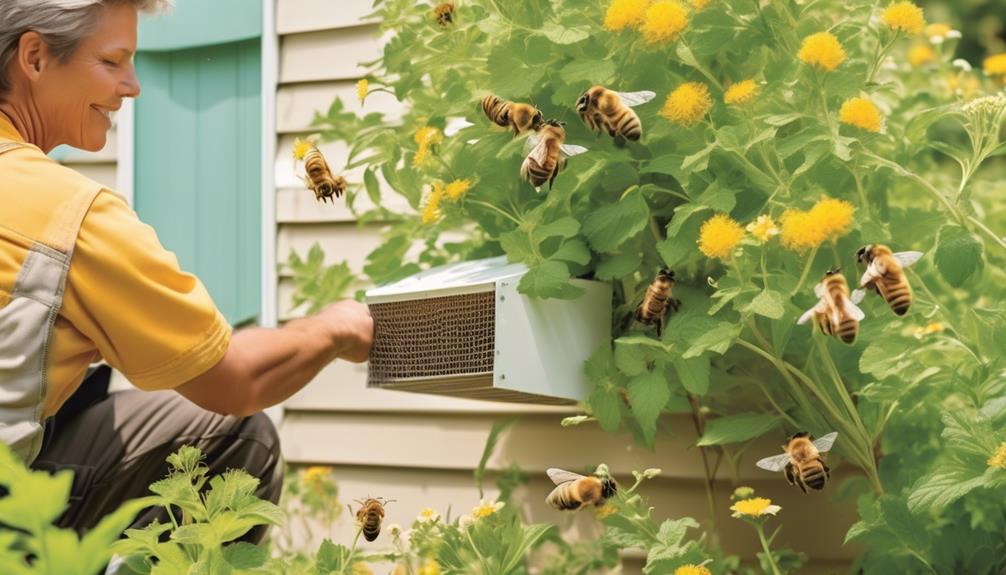
Once you've successfully had the bees removed and relocated by a professional beekeeper, it's crucial to take proactive measures to prevent a future infestation. Prevention is key and can save you time, money, and the stress of dealing with another swarm of bees.
Firstly, ensure that all potential entry points in your home are sealed off. Bees can enter through small cracks and crevices in walls, roofs, or windows. So, check your property thoroughly and seal these areas with caulk or another appropriate material.
Next, try to make your property less appealing to bees. Bees are attracted to flowers and certain scents. If you've got a garden full of flowers, consider planting them further from your home.
Lastly, regular maintenance is essential. Trim overgrown shrubs and trees as they can provide shelter for bees. Regularly check and clean areas like gutters and vents where bees might build a hive.
Frequently Asked Questions
What Are Some Common Misconceptions About Bees?
You might think all bees are aggressive, but that's not true. Most bee species are quite docile unless provoked.
Another misconception is that bees are harmful to your garden. In fact, they're crucial for pollination and help your plants thrive.
Lastly, many believe all bees make honey, but only honeybees do.
Are There Specific Types of Plants That Attract Bees More Than Others?
Yes, certain plants do attract bees more than others. You'll find bees buzzing around flowers like lavender, sunflowers, and foxgloves. They're attracted to these due to their bright colors and sweet nectar.
Herbs like rosemary and thyme also draw bees in. If you're looking to attract bees to your garden, planting these types of flowers and herbs is a great start.
Just remember, bees play a crucial role in pollination, so they're beneficial to have around.
How Does Climate and Seasonality Affect the Behavior of Bees?
Climate and seasonality greatly impact bee behavior. During warmer months, you'll see them buzzing around, busy collecting pollen. They're vital for plant pollination.
However, in colder seasons, they become less active or hibernate. Extreme conditions, like heatwaves or cold snaps, can disrupt their routines and even be detrimental.
Understanding these behaviors helps you anticipate their presence and manage any potential bee-related issues around your home or garden.
What Are Some Potential Health Risks Associated With Bee Stings?
Bee stings can cause various health risks for you. If you're allergic, a single sting can trigger a potentially life-threatening anaphylactic reaction. Symptoms may include severe swelling, difficulty breathing, or loss of consciousness.
Even if you're not allergic, multiple stings can lead to serious issues like kidney damage or heart failure. Remember, it's crucial to seek immediate medical attention if you experience severe reactions after a bee sting.
Can Bees Become Aggressive if Their Hive Is Threatened?
Absolutely, bees can become aggressive if they feel their hive is under threat. It's their natural instinct to protect their queen and home. If you come too close or disrupt their hive, they're likely to swarm and could potentially sting. So, it's vital to maintain a safe distance.
If you've a bee problem, consult a professional who can safely relocate the hive if necessary, without resorting to lethal methods.
Conclusion
In conclusion, understanding bee behavior, using natural repellents, and employing DIY relocation techniques can help in managing bee infestations. If these efforts don't pan out, consider hiring professional beekeepers for effective, humane removal.
Remember, it's crucial to prevent future infestations to maintain a bee-free zone. But let's not forget, bees play a vital role in our ecosystem. So, let's handle them wisely and humanely.


